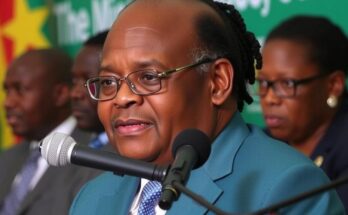In 2024, elections across over a dozen African countries resulted in both the retention of power by ruling parties and unexpected defeats for incumbents. Key developments included Frelimo’s continued dominance in Mozambique, the historic elections in Botswana and Namibia, and variances in electoral outcomes in South Africa and Rwanda, as well as postponed elections in coup-affected nations of the Sahel region. Public discontent over economic challenges and governance issues permeated the electoral narrative.
In 2024, numerous African nations conducted elections ranging from presidential to parliamentary contests, yielding mixed results. While some entrenched ruling parties maintained their grip on power, other incumbents faced significant and unexpected defeats. The elections highlighted both stability and unrest, predominantly featuring the re-election of long-standing leaders alongside the emergence of opposition figures in traditional stronghold regions.
In Southern Africa, Comoros witnessed a fourth-term victory for President Azali Assoumani, resulting in immediate violent protests after the opposition rejected the election results. Conversely, Mozambique’s Frelimo party extended its nearly five-decade reign, although opposition leader Venancio Mondlane’s supporters protested the alleged electoral irregularities. Notably, Botswana made history with the election of opposition leader Duma Gideon Boko after nearly six decades of a single-party rule.
In South Africa, the African National Congress (ANC) failed to secure an outright majority for the first time since the end of apartheid, prompting the formation of a coalition government. Voter dissatisfaction over service delivery and internal party issues contributed to the ANC’s loss. Meanwhile, Namibia’s ruling party SWAPO retained power and elected the nation’s first female president, though her victory was marred by allegations of electoral flaws.
Transitioning to East Africa, President Paul Kagame of Rwanda won again, boasting nearly unanimous support, although analysts raised concerns over the legitimacy of such results amidst restricted political opposition. In West Africa, former President John Mahama’s stunning comeback in Ghana reflected public concern over economic conditions, while Senegal saw the election of Bassirou Diomaye Faye, noted for his anti-corruption stance and youthfulness.
In contrast, the Sahel region experienced election postponements, indicative of a prevailing military grasp on power and freedom restrictions on media coverage. As such, many regions in Africa displayed significant political volatility despite certain successes in democratic transitions.
In 2024, the African electoral landscape was marked by both the retention of power by longstanding incumbents and surprise victories for opposition parties, showcasing the continent’s complex political dynamics. While some countries maintained stability through familiar ruling parties, others faced unrest arising from disputed election outcomes. This electoral cycle illustrates the varying degrees of democratic practice across the continent, as nations grapple with the consequences of military influence, economic challenges, and calls for reform.
The 2024 elections across Africa revealed a significant dichotomy in political outcomes. Incumbents in several nations retained power amidst public discontent, while others experienced surprising defeats, marking a shift in political engagement and voter expectations. The events underscore the importance of electoral integrity and the role of opposition parties in shaping democratic futures within African states, even as certain regions face escalating challenges to democracy.
Original Source: www.voanews.com




